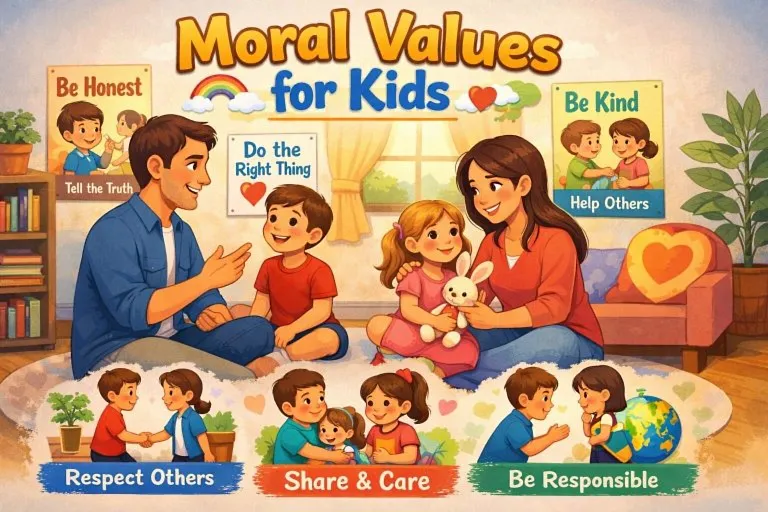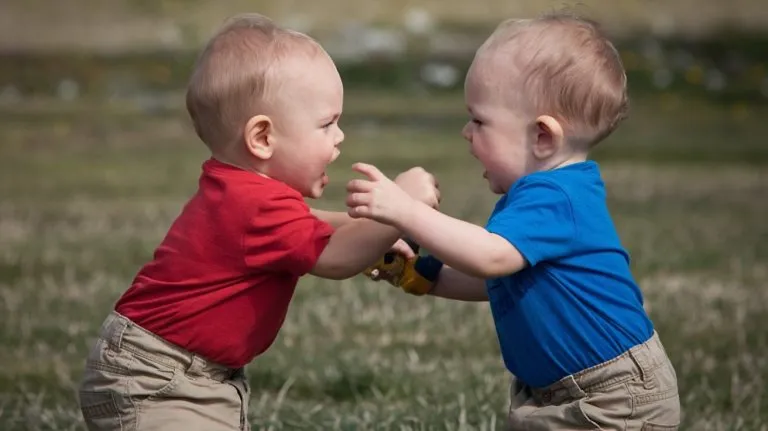Top 10 Ways to Teach Your Child Humility
Teaching children essential life values is a cornerstone of parenting, and one of the most significant traits to instil is humility. In a world where self-promotion and individual achievement are often celebrated, understanding how to teach humility to a child can seem challenging but is crucial for their personal development. Humility is a much-appreciated and much-needed virtue in today’s world. A person is said to be humble when he is modest and has an unassuming attitude without any hint of arrogance or pride. Parents may like to cultivate this quality in their kids right from childhood. Your kid should be humble about his achievements, even when they seem remarkable. Here are the top 10 ways to teach your child humility.
Why Encourage Humility in Children?
Humility for kids is about understanding and appreciating their strengths and limitations while valuing and respecting the contributions and achievements of others. Some of the reasons parents may want to boost humility in children can be:
- Teaching children humility can help them see situations from a proper perspective, which may promote an appropriate measure of self-confidence.
- Being humble may ensure that your child is courteous and respectful to other people.
- Humility may train your child to listen to others as he will learn to place others before himself.
- It may also facilitate his desire to learn from others, thereby warranting his personal and intellectual growth.
- Cultivating humility in kids can help keep their egos in check. In today’s digital world, where bragging is usually the norm, egos may easily get inflated.
- It may foster their openness to new ideas, curiosity, and creativity, thus allowing them to explore the world around them.
- A humble child may interact better with people, which can help build healthy and lasting social relationships.
- Inspiring humility in children may also inculcate a feeling of gratitude in them. They may learn to value and be grateful for all that they have.
- Promoting humility in children may motivate them to become good human beings who are always ready to help others.
- Humble children are generally happier and safer, knowing they are well-liked and self-assured in their knowledge and abilities.
How to Teach a Child to Be Humble?
Most parents may ask how to explain humility to a child. To put it simply, humility is the ability by which you consider others before yourself. It’s not about thinking yourself less but thinking less about yourself. A few simple ways of explaining humility to a child can be:
1. Model Behaviour
Children may learn better when parents teach through personal example. Also, it must be modelled consistently as a lifestyle rather than an on-and-off example. Children tend to notice everything. They may note when you lose your temper in traffic, mistreat someone or use your position of power to yield results in your favour. They also observe when you hold a door open for an elderly woman, act respectfully towards others, and speak kindly to people. Therefore, as parents, you may like to be mindful of your behaviour. Humility begins at home with the parents.

2. Build Them Up
Try to highlight what is being done instead of what gets done or what you have. Considering and accepting that you may not always receive credit for your actions is part of learning to be humble. For example, saying, “Dinner is ready, and the kids helped a lot”, is better than claiming all the glory by saying, “I cooked the dinner”. This way, you teach kids to place others before yourself. You can also stir humility by participating in many helpful activities, like cleaning a park, volunteering at hospitals, and picking up trash at public places. Your child may learn that serving others is not a weakness but an honourable trait.
3. Encourage Kids to Admit Mistakes
Children may indoctrinate humility if they learn to admit to their mistakes. Claiming responsibility for your mistakes is an important part of integrity. Parents must encourage kids to apologise for their mistakes and learn from them, curbing their instinct to justify and defend themselves. One way to promote confession for wrongdoing can be by displaying mercy and forgiveness. Children who feel comfortable approaching parents and talking freely without fear are less expected to be defensive and dishonest.

4. Promote Understanding of Other’s Perspective
Help your child realise that every person he is likely to meet may know something that he doesn’t, and thus, he can learn from them. Also, whenever your child gets into a disagreement with a friend, ask him to consider and reflect upon the reasons why his friend may be upset and how he could have handled the situation better. Learning to show consideration and pay attention to other people’s thoughts and ideas may help to inculcate humility.
5. Discourage the Attitude of Entitlement
Most parents longing to advance their kid’s self-esteem continually tell him how smart, unique and special he is. This seemingly positive approach to parenting can sometimes develop an attitude of entitlement and arrogance in kids. Children may start believing that they have a special right to certain advantages in life, like winning, getting good grades, acquiring more materialistic stuff, and leading an easy life. They may not take too kindly to disappointments or that occasional failure. Therefore, parents must nurture confidence, not overconfidence.

6. Foster Appreciation Towards Life
Motivate your child to acknowledge the efforts of other people. For example, make it a point to attend other’s sporting matches, musical or family events. He may learn to value personal relations more than accomplishments or events. You can simply guide your kid to show appreciation, like with a hug or thank you. Talk to him regarding the value of supporting and cheering others. For example, if his cousin scores well in class, ask your child to write a congratulatory email. He may realise the significance of celebrating other’s achievements. Your child can learn humility by demonstrating the worth of celebrating others’ successes.
7. Willingness to Control Pride
Pride normally demands to be heard and seen. On the other hand, a humble kid may know he is important, irrespective of whether he is seen or heard. This sense of self may propel him to indulge in acts of service in various forms. For example, service to others can be de-escalating an argument, including someone in a game, allowing someone to go ahead in a queue, ready to share the limelight with a good friend. Humility may allow us to behave in a way that not only holds our dignity but also lets us celebrate other’s dignity.

8. Expand Sense of Self
Parents, while impressing upon their children that they are valuable and gifted, may also like to highlight the importance of using the gifts to serve others and not merely for themselves. This quality can help enlarge your kid’s sense of self and his view of the world. Parents can form a principle of service to other people by sponsoring a child’s education or supporting a charity, which may help your kid expand his vision to include others and take in more.
9. Expose Kids to Great Stories
Encourage your kids to read about great personalities like Mother Teresa, who spent her life serving humanity. You can also steer them to watch movies based on their lives and struggles.

10. Give Praise/Correction When Required
Make sure you commend your child when he does well, like scoring good marks. In case he gets fewer marks, help him understand how he may improve rather than blaming the teacher or school. Be prompt to correct serious errors or wrong attitudes, like a tendency to brag, but without damaging his self-respect. Refrain from humiliating or bullying your child.
FAQs
1. At what age should I start teaching my child about humility?
It’s never too early to start teaching kids how to be humble. Even young children can begin to understand the concept through simple actions like sharing, saying thank you, and recognising others’ feelings. Parents can introduce more complex ideas about humility as children grow through discussions, role modelling, and real-life experiences.
2. How can storytelling help in teaching humility?
Stories, especially those with moral lessons, can be powerful tools for teaching humility. Share stories about historical figures, family members, or fictional characters demonstrating humility. Discuss the outcomes of their actions and how their humble nature positively impacted those around them.
Teaching kids humility is an ongoing process that involves consistent effort, patience, and intentionality. As parents, it’s our responsibility to appreciate and be proud of our kids when they act humbly. Recognising these instances can inspire similar good deeds in the future. More importantly, it reinforces the message that treating people with dignity is not just valued, but also desirable. This role in shaping our children’s character is a significant part of our parenting journey.
Also Read:
Essential Life Lessons for Kids
How to Teach Responsibility to Kids?
Tips for Instilling Leadership Skills in Children
Good Habits Every Parent Must Teach Their Child
Was This Article Helpful?
Parenting is a huge responsibility, for you as a caregiver, but also for us as a parenting content platform. We understand that and take our responsibility of creating credible content seriously. FirstCry Parenting articles are written and published only after extensive research using factually sound references to deliver quality content that is accurate, validated by experts, and completely reliable. To understand how we go about creating content that is credible, read our editorial policy here.























